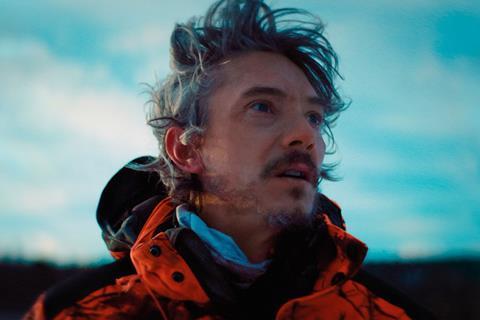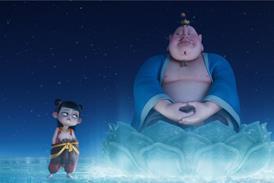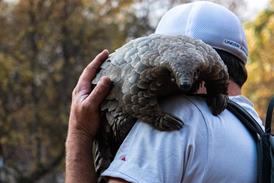Swann Arlaud and Woody Norman battle the elements in this beautiful if implausible Norwegian survival thriller

Dir/scr. Vladimir de Fontenay. France/Norway/Belgium/UK. 2025. 114mins
Frontier-style masculinity is in crisis, and undergoing a severe case of the shivers, in Sukkwan Island, essentially a father-son two-hander set against the rigours of a Norwegian winter. The duo’s interplay in a snowbound survival drama – which one suspects was not that much cosier an experience for the actors than the characters – is a prime attraction, as is the bleak but breathtaking setting. Far less convincing, however, are the narrative and its psychological intricacies.
Always watchable for Amine Berrada’s cinematography
Premiering in Sundance’s World Cinema Dramatic Competition – and to be released in France by Haut et Court and the UK by Curzon – this is the second feature from French writer-director Vladimir de Fontenay, following 2017’s Canada-set Mobile Homes. Above all, Sukkwan Island should attract attention for its two rising stars of different ages. They are British mid-teen Woody Norman, who made a splash aged 11 in Mike Mills’s C’mon C’mon, and Swann Arlaud, a compelling stalwart of French cinema, who attracted international attention in Justine Triet’s Cannes- and Oscar-winning Anatomy of a Fall.
The film begins with a young man, Roy (Screen Rising Stars Scotland alumnus Ruaridh Mollica) making a long overnight drive through a Northern winter landscape, then meeting up with helicopter pilot Anna (Finnish actor Alma Pöysti, from Aki Kaurismäki’s Fallen Leaves). She flies him to the remote, uninhabited Sukkwan island, where a ramshackle cabin was the site of life-changing events years earlier. Flash back to Roy (played by Norman) as a teenager in the UK, living with his mother Elizabeth (Tuppence Middleton). Roy’s estranged father Tom (Arlaud) makes a surprising proposition: that the lad should take a year off school and join him on the island, to rough it amid the elements and do some overdue bonding.
Sukkwan is indeed idyllic when the duo arrive; after all, what’s a draughty old cabin when there are fish to be caught and a magnificent autumn landscape to enjoy? But their dilapidated home is wrecked, apparently by a bear, leaving them without radio communication. Then a harsh winter sets in – and it can only be a matter of time before one or both of these no longer happy campers starts to unravel.
Things get ever more intense – if not always more compelling – until events take a surprise late turn that, together with the coda, viewers may find implausible and unearned. The story – transplanted from its original Alaskan setting – is based on a section of David Vann’s autobiographically-inspired 2009 novel-slash-collection ’Legend Of A Suicide’. Accordingly Sukkwan Island has a certain self-reflexive dimension built in, but not necessarily to its benefit.
Norman is impressive in a role combining physicality (chopping wood, trekking through snow, taking icy swims) with a gamut of emotional registers, from insouciant joy through adolescent glumness to frazzled desperation. Less convincing is Arlaud, a consistently interesting actor, but who suffers here in a largely English-speaking role (Tom, like the actor, is evidently French), with the character coming across as more enigmatically strange than perhaps is required by the more strictly existential aspects of the role.
There is little back story at the start, leaving us to wonder exactly who Tom is, why he has chosen to come to Sukkwan, and indeed how Arlaud’s otherworldly qualities – his sly facial expressions and elfin features, battered as they are here – quite define this character. The story and the psychological coherence would seem to rely on Tom effectively being that perennial archetype, the regular Joe out of his depth, whereas the casting of Arlaud primes us to see Tom more as a sort of failed artist-visionary. As Tom gets ever more erratic and weatherbeaten, Arlaud holds our attention, but it becomes increasingly hard to buy the psychological shifts
The film’s emotional drive is also undermined by a generic score of ambient electronica by Florent Chronie-De Maria and Jeremy Villecourt – and rather lazy use of a Talking Heads hit for a moment of lakeside jubilation. But the film is always watchable for Amine Berrada’s cinematography. He distinguished himself with 2023’s Senegalese drama Banel & Adama, and here finds richly atmospheric magic in the Northern shifts of climate: light through falling snow or deep mist and, in one gorgeous shot, the shadows cast by a distress flare over a forest at night.
Production companies: Haut et Court, Maipo Film, Versus Production, Good Chaos
International sales: MK2 Sales, intlsales@mk2.com
Producers: Carole Scotta, Eliott Khayat, Caroline Benjo
Screenplay: Vladimir de Fontenay, based on the story by David Vann
Cinematography: Amine Berrada
Production design: Eve Martin
Editor: Nicolas Chauderge
Music: Florent Chronie-De Maria, Jeremy Villecourt
Main cast: Swann Arlaud, Woody Norman, Alma Pöysti, Tuppence Middleton, Ruaraidh Mollica

























No comments yet